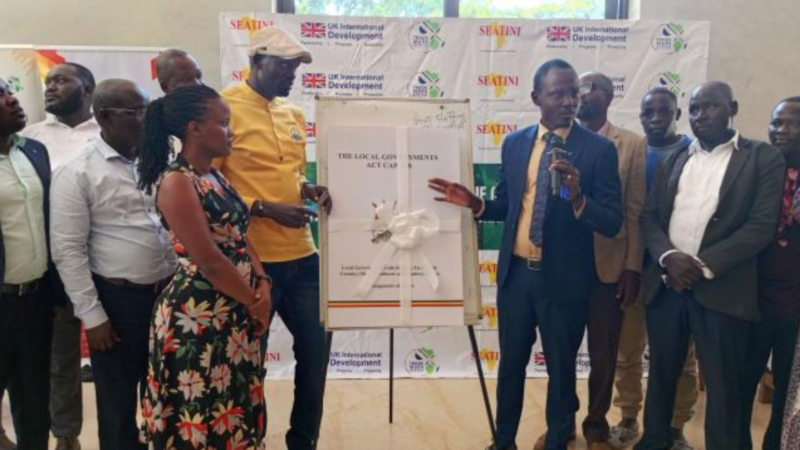In a significant step toward improving the maize value chain in Northern Uganda, the districts of Gulu and Amuru have introduced a maize producers and traders by-law for farmers and traders in Paicho and Guruguru sub-counties.
Developed under the Strengthening the Maize Value Chain Compliance and Competitiveness project, the by-law aims to boost quality standards and market access for maize producers. The initiative is spearheaded by the Southern and Eastern Africa Trade Information and Negotiations Institute (SEATINI) and TradeMark Africa (TMA), with funding support from the UK government.
Regulating Production and Strengthening Market Prospects
During the launch at Acholi Inn in Gulu, Herbert Kafeero, SEATINI’s Programs and Communications Manager, highlighted the importance of the by-law in regulating farmers, produce dealers, and millers to ensure adherence to required production standards.
Beyond setting quality benchmarks, the by-law introduces structured frameworks for the maize value chain, fostering sustainable practices and enhancing sector competitiveness. One of its key provisions is the branding and packaging of maize, positioning the districts for potential export opportunities.
Kafeero also emphasized that the by-law will be translated into local languages to guarantee accessibility and that all actors in the maize sector will undergo training to understand its contents before its official rollout across various local governments.
Enhancing Market Access and Overcoming Past Challenges
Praxeda Ndagire, the focal point person for the project at TMA, expressed confidence that the by-law will improve the quality and safety of maize produced in Gulu and Amuru.
She referenced past rejections of Ugandan maize at the South Sudan border due to aflatoxin contamination, noting that proper post-harvest handling will help local farmers secure better market opportunities.
Leadership and Farmers Endorse the Initiative
Auric Oryem, the Assistant Chief Administrative Officer (CAO) of Gulu, urged leaders and farmers to embrace the by-law's implementation to facilitate its scaling across the district. Similarly, Stephen Ojara, Principal Assistant Secretary to the CAO of Amuru, encouraged farmers not to sell their land for quick financial gain but to invest in maize production using proper agronomic practices aligned with the by-law.
Local farmers welcomed the initiative with optimism, hoping it would lead to better prices and expanded market access. John Okello, a farmer from Amuru, pointed out storage limitations that often result in post-harvest losses and aflatoxin contamination, expressing hope that the project would address these challenges.
Likewise, Grace Apiyo, a farmer from Paicho sub-county, highlighted how limited land access restricts women from securing credit for quality seeds and transitioning to commercial farming.
The Maize Sector’s Untapped Potential
According to the Food and Agriculture Organization (FAO), maize serves as a key source of income, food security, and nutrition for over 70% of Ugandans. Despite its economic potential, the sector is undermined by poor quality standards, aflatoxin contamination, and low market competitiveness.
A March 2025 baseline survey conducted by SEATINI across Gulu, Amuru, and Elegu found that 93% of value chain actors, mainly farmers, had never received formal training or technical assistance regarding maize production, harvesting, or post-harvest handling.
The same report also revealed that 70% of farmers were unaware of the financial benefits of adhering to production standards, particularly in securing premium markets and earning better prices.
With the introduction of the by-law, stakeholders hope to transform maize farming in Northern Uganda into a competitive and sustainable industry.










